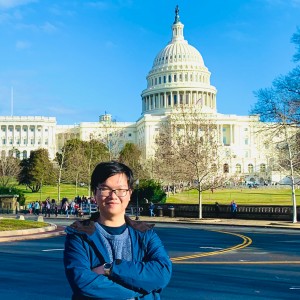Unless you’re in a Hallmark movie, the holidays can be challenging. Bad weather, travel delays and reunions with far-flung relatives create the perfect pressure cooker environment by the time everyone sits down around the dinner table — especially if said far-flung relatives have far-fetched ideas and opinions.
We asked five Kenyon community members — psychology faculty, staff trained in spiritual counseling and conflict resolution, and students who contribute to the Center for the Study of American Democracy (CSAD) mission of civil discourse — to share their stress-relieving and conflict-reducing tips for the holiday table.
Leah Dickens, assistant professor of psychology
“Orienting to gratitude is something we can all get better at.”
 When we think of Thanksgiving, we naturally think of gratitude. On this one day a year, gratitude is supposed to be front and center as we acknowledge our many blessings. But then we might also think of stressful travel or house preparations, frustrating political debates at the dinner table, or children fighting with one another over the last slice of pie. When we celebrate the holiday with our family (or someone else’s), sometimes reality does not live up to the ideal.
When we think of Thanksgiving, we naturally think of gratitude. On this one day a year, gratitude is supposed to be front and center as we acknowledge our many blessings. But then we might also think of stressful travel or house preparations, frustrating political debates at the dinner table, or children fighting with one another over the last slice of pie. When we celebrate the holiday with our family (or someone else’s), sometimes reality does not live up to the ideal.
As a gratitude researcher, I recognize this truth, but I also recognize how practicing gratitude makes it easier. Even when it might not come naturally, trying to think of things we’re grateful for is like practicing any other skill. You don’t show up on a basketball court ready to make three-pointers every shot, but with practice (and patience, and time), you can often see improvements in your athletic skill. It’s the same with gratitude. Putting in that extra effort to notice the many things and people we can appreciate in our lives — with time, this makes it easier to be grateful.
During the past year or two, it hasn’t always been easy to focus on the positives, and I do not suggest anyone tell a family member to simply “think happy, be happy!” (Please don’t trivialize anyone’s mental state!) But whenever possible, even in hard times, there’s often something we can recognize and appreciate. A friend treating us to coffee, a child wanting to read a book with us, a relative passing the mashed potatoes … little or big, silly or important, orienting to gratitude is something we can all get better at. And hopefully, it’ll help soften some of the stressors over the holiday season. It’s not a miracle cure, but a slight change in focus is worth a shot. “Sure, Aunt Rita and I don’t agree on everything, but wow, her pumpkin pie is amazing.”
William Yanek, CSAD student associate; political science major from Lawrence, Kansas
“Get beyond partisan talking points to understand why your family and friends believe what they do.”
 One of the unfortunate symptoms of today’s political climate is how politics has seeped into everything, including holiday gatherings with family and friends. As the editor of the Middle Path Magazine, I believe it is important to have rigorous and even uncomfortable conversations about the issues of the day for the health of democracy. However, when we have these conversations with those closest to us, we should be careful to separate our ideological priorities from our personal ones.
One of the unfortunate symptoms of today’s political climate is how politics has seeped into everything, including holiday gatherings with family and friends. As the editor of the Middle Path Magazine, I believe it is important to have rigorous and even uncomfortable conversations about the issues of the day for the health of democracy. However, when we have these conversations with those closest to us, we should be careful to separate our ideological priorities from our personal ones.
Our conversations with family and friends should not be about scoring political “points” or “winning” the argument for our side. Rather, we should see these conversations as an opportunity to see the world through the eyes of those who matter most to us. So in your holiday political conversations, get beyond partisan talking points to understand why your family and friends believe what they do. Don’t dwell on your differences. Seek common ground, and remember that people are more than the opinions they hold. There’s a time and place to hash out political differences, but the holiday dinner table is where we come together to overcome our differences, build community and remember what really matters.
Carrie Knell, ombudsperson
“We can’t control what others do or say, but we can adjust what we expect from them and how we respond.”
 As we venture out for our holiday celebrations, we can expect to encounter a bit of conflict along the way. Spending an extended amount of time with friends and family who are not present in our day-to-day lives brings the inevitable friction between people who see the world differently. We can’t control what others do or say, but we can adjust what we expect from them and how we respond. Expect that you may hear things you do not agree with, and that is OK. Remember that you value this relationship. Feel free to add your own perspective in a way that respects the other person and allows them to save face. Statements such as “how I see it…” or “my experience has been…” allow you to express yourself and provide a different perspective without potentially damaging the relationship. The holidays go quickly and our time together is too precious to waste mired in conflict. If it happens, respond calmly and then move on, perhaps to a different topic.
As we venture out for our holiday celebrations, we can expect to encounter a bit of conflict along the way. Spending an extended amount of time with friends and family who are not present in our day-to-day lives brings the inevitable friction between people who see the world differently. We can’t control what others do or say, but we can adjust what we expect from them and how we respond. Expect that you may hear things you do not agree with, and that is OK. Remember that you value this relationship. Feel free to add your own perspective in a way that respects the other person and allows them to save face. Statements such as “how I see it…” or “my experience has been…” allow you to express yourself and provide a different perspective without potentially damaging the relationship. The holidays go quickly and our time together is too precious to waste mired in conflict. If it happens, respond calmly and then move on, perhaps to a different topic.
Andrew Nguyen ’23, CSAD student associate; political science and mathematics major from Hanoi, Vietnam
“You might not remember who won the roundtable debate, but the life lessons you pick up might follow you for the rest of your life.”
 As an international student, Thanksgiving is still a new concept to me. Still, several times a year, my whole family would gather to celebrate certain events, so the concept of a big gathering or a “communal meal” is quite familiar. In my family, we tend to avoid controversial topics like politics because we know that there will be differences of opinion. Instead, we focus on our personal stories — it could be a happy story, but it could also be a lesson that we learn after an unfortunate event. I believe that both the speaker and the listeners benefit tremendously from this type of story; furthermore, I feel like those stories add to the spirit of “togetherness” that Thanksgiving is all about. Years from now, you might not remember who won the roundtable debate, but the life lessons you pick up might follow you for the rest of your life.
As an international student, Thanksgiving is still a new concept to me. Still, several times a year, my whole family would gather to celebrate certain events, so the concept of a big gathering or a “communal meal” is quite familiar. In my family, we tend to avoid controversial topics like politics because we know that there will be differences of opinion. Instead, we focus on our personal stories — it could be a happy story, but it could also be a lesson that we learn after an unfortunate event. I believe that both the speaker and the listeners benefit tremendously from this type of story; furthermore, I feel like those stories add to the spirit of “togetherness” that Thanksgiving is all about. Years from now, you might not remember who won the roundtable debate, but the life lessons you pick up might follow you for the rest of your life.
Marc Bragin, Jewish chaplain and co-director of spiritual and religious life
“May we provide the space and the grace for each other so that we may learn from one another.”
 This past year and a half has been challenging, but has pushed many of us to learn to communicate with each other in different ways. These include being online more often than we may be accustomed, or maybe we spend more time on the phone and do not necessarily see each other face to face.
This past year and a half has been challenging, but has pushed many of us to learn to communicate with each other in different ways. These include being online more often than we may be accustomed, or maybe we spend more time on the phone and do not necessarily see each other face to face.
Because of this, we can miss social cues. We have to re-train ourselves in how to engage with each other using more senses than we are used to using. Seeing facial expressions, navigating non-verbal expressions, processing body language — all of these take practice and time. During this holiday, may we provide the space and the grace for each other so that we may learn from one another. May we give thanks for one another this holiday season. Even as we learn how to love one another once again, the mere fact that we are trying is enough to show that we care.